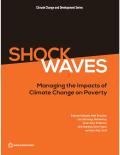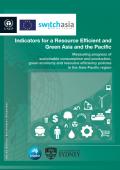
Climate change and climate policies will affect poverty reduction efforts through direct and immediate impacts on the poor and by affecting factors that condition poverty reduction, such as economic growth. This report explores the relation between climate change, climate policies, and poverty outcomes by examining three questions: the (static) impact on poor people's livelihood and well-being; the impact on the risk for non-poor individuals to fall into poverty; and the impact on the ability of poor people to escape poverty. The report explores various channels through which climate change and policies will affect poverty: economic impacts through incomes and prices; natural disasters and their effects on assets and livelihoods; and health impacts. It also investigates policy options to ensure adaptation and mitigation policies -- such as adaptive and well-targeted social protection, public investments, and financial inclusion policies -- contribute to poverty reduction and protect poor people against climate change impacts.
This publication provides an opportunity for Asia and the Pacific policymakers and stakeholders, such as those from the private sector, academia and civil society organizations, to actively engage with the global negotiations, and to lay out the financing and partnership frameworks for the development agenda beyond 2015 from the regional perspectives.
The publication calls for the Asia-Pacific region to work together to raise and channel more substantial financial resources to invest in the social sector, infrastructure development and efforts to tackle climate change in order to ensure a transformative change to bring about inclusive growth and sustainable development.
Adequate, appropriate finance is crucial for sustainable development in the Asia-Pacific region. The United Nations Economic and Social Commission for Asia and the Pacific UN (ESCAP) estimates that the region needs to invest around US$2.5 trillion a year between 2013 and 2030 to achieve key sustainable development goals:
- US$500-800 billion to close gaps in education, health, employment, social protection and basic access to energy services.
- US$800-$900 billion for developing infrastructure for energy, transport, telecommunications and water and sanitation.
- US$500-800 billion for climate change mitigation and renewable energy.
This briefing has been produced by the UNEP Inquiry as a contribution to discussions at the Regional Consultation on Financing for Development in Asia and the Pacific which took place in Jakarta, Indonesia in April 2015. It draws on the Inquiry’s ongoing research, and country engagement in particularly focusing on the sustainable development, financial systems and actions to be conducted for the Asia and the Pacific region.

Natural resources are the foundation of economic development. This report reveals the patterns and the evolution of natural resource use with 118 indicators in 26 countries of the Asia and the Pacific region over the last 40 years. The analysis shows that resource use in the region is both inefficient and unsustainable. The Asia-Pacific region will not be able to base its future economic growth on declining costs of natural resources as was possible during most of the twentieth century. An increasing reliance on resources from abroad and volatility in the global resource markets will pose challenges to the economic resilience of countries in the region. In this new economic context resource efficiency and decoupling of economic growth and resource use will be fundamental to the economic success of the region. The knowledge generated by this report helps to improve the understanding of the natural resource use and emissions consequences of economic growth in Asia and the Pacific to support policy formulation, monitoring and policy evaluation in the countries of the region.
This paper was prepared at the request of the Republic of Nauru, Chair of the Alliance of Small Island States. The global low-carbon transformation, needed to tackle the climate crisis is within reach but will require immediate decisive political action from leaders around the world. This paper identified the imperatives for transformative action to a low-carbon economy, technological opportunities, as well as necessary policy, financial and economic considerations.
